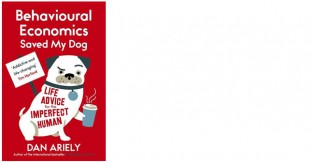Latest posts
A masterclass in creating value
What’s going on at parkrun?
Virtue-signalling all the way to the bank
Bud Light: brand purpose or virtue-signalling?
The Coddling of the American Mind, by Greg Lukianoff and Jonathan Haidt
Belonging, by Owen Eastwood
Such a simple thing
The Long Win, and The Scout Mindset
The Cult of We by Eliot Brown and Maureen Farrell
Coffee and covid modelling
By theme
Marketing strategy
Insight & metrics
Innovation & inspiration
Brand & positioning
Marketing communications
Business purpose
Leadership
By industry sector
Financial services
Retail
FMCG
Technology & start-ups
Consumer services
Business to business
Other sectors
By type
Books
Comment
Quotes
Thought leadership
The best reason to read this short book is to spend time in the company of the author. Dan Ariely is funny and wise, thought-provoking and outspoken, prejudiced and playful, and not afraid to stick his neck out (for example, on the merits of marriage, and how to decide whether to get married). The book is an entertaining collection from his Wall Street Journal advice column, each question and response complemented by a witty cartoon. Topics include: letting cars in ahead of you in traffic, having a son-in-law you hate, and going running from the office at lunchtime (on which Dan says, “Ordinarily I try to run regularly, maybe once every five or ten years.”) It’s worth the £8.99 for his tip on how to handle an intimidating sommelier. Explain that you have allocated a total of £50 to cover the wine and the tip combined, and you’d like a recommendation on wine.
There are a few more fundamental points too, about how to make changes for the better in your life. This is where the serious behavioural economics comes in. He gives advice on how to make better habits of diet and exercise stick, working efficiently and overcoming procrastination, and on making financial and life decisions. Some of it is playful, some serious, on ways to tackle our tendency to allow short term preferences to win out over what we know is for our long term good. Good tips too on having your work appreciated by others. In short, if it looks too easy, you won’t get the same credit.
If it’s robust behavioural economics you’re after, best stick with Kahneman (“Thinking Fast and Slow”, the definitive text on BE) or Cass and Sunstein (the politicians’ handbook, “Nudge”). If you’ve been meaning to read a book on BE and not got round to it, start here.
Latest posts
A masterclass in creating value
What’s going on at parkrun?
Virtue-signalling all the way to the bank
Bud Light: brand purpose or virtue-signalling?
The Coddling of the American Mind, by Greg Lukianoff and Jonathan Haidt
Belonging, by Owen Eastwood
Such a simple thing
The Long Win, and The Scout Mindset
The Cult of We by Eliot Brown and Maureen Farrell
Coffee and covid modelling
By theme
Marketing strategy
Insight & metrics
Innovation & inspiration
Brand & positioning
Marketing communications
Business purpose
Leadership
By industry sector
Financial services
Retail
FMCG
Technology & start-ups
Consumer services
Business to business
Other sectors
By type
Books
Comment
Quotes
Thought leadership
